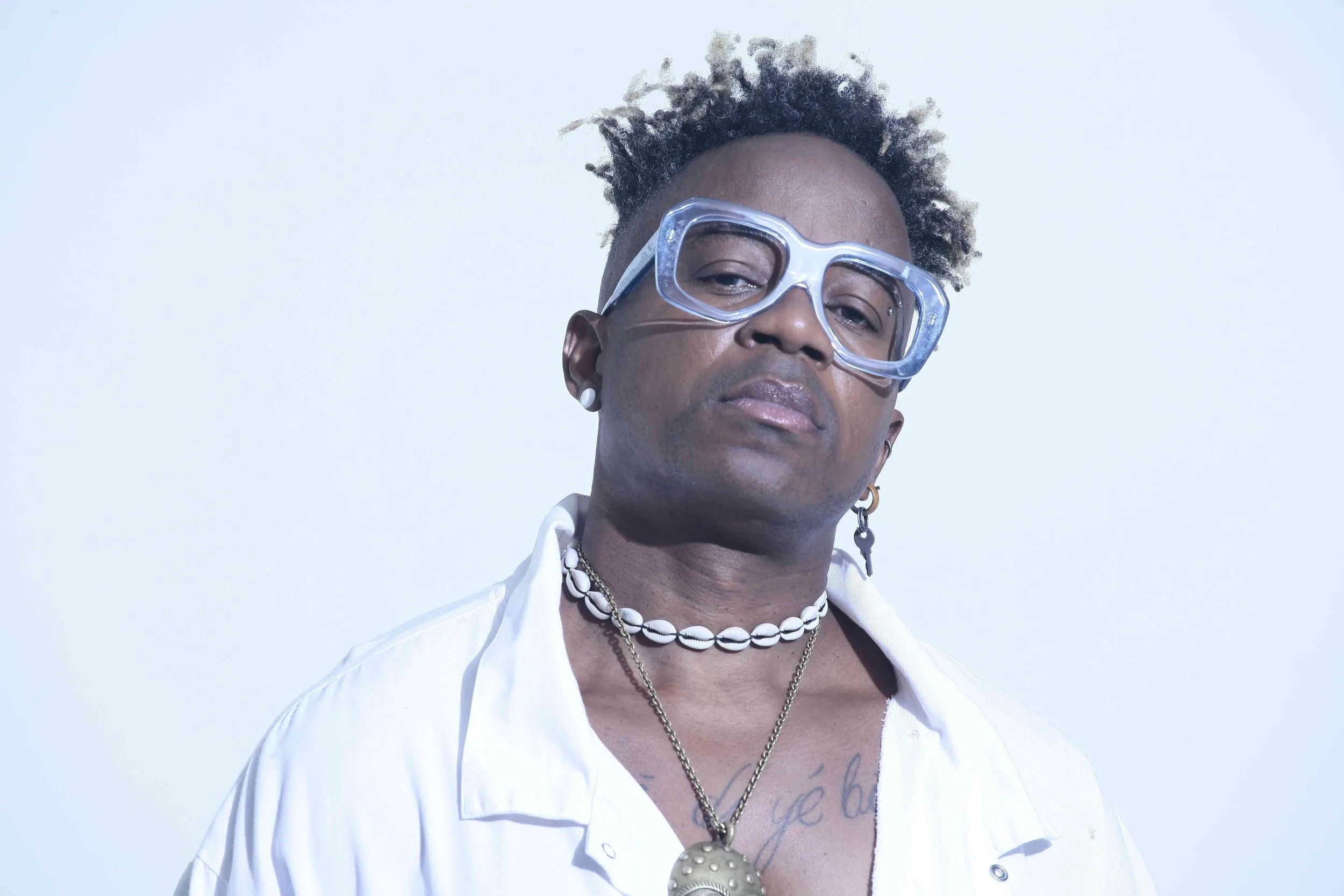Blick Bassy (Colors, Sabrina Bellaouel, FFO James Blake) new album + video
BLICK BASSY
NEW ALBUM - ‘MADÍBÁ’
OUT NOW VIA INFINÉ - STREAM HERE
WATCH THE NEW VIDEO FOR ‘HOLA MÈ’ FROM HERE
PRESS IMAGES HERE
Synthetic textures offset by tipsy trombones and buzzing bassoons, Bassy's turns range from tender (LoBa) to joyous (Touye) at the crossroads of electric, folk and soul MOJO
By shedding sonic layers, Bassy brings his beautiful voice more to the fore than ever before. It is presented in an even more haunting guise, if that’s possible, which is an utter gift to the listener Louder Than War
Blick Bassy today releases his new album, ‘Madíbá’ via InFiné (Sabrina Bellaouel). His fifth, ‘Madiba’ is sung in the Baasa language of France-based Bassy’s native Cameroon. It follows acclaimed 2019 album ‘1958’ (winner of the Sacem World Music Grand Prize & Songlines’ Best African Album), a collaboration with Disclosure and the publication of Blick’s award-winning debut novel. Meaning ‘water’, ‘Madíbá’ brings together twelve songs in the form of fables, dedicated to the theme of water, in which Bassy’s high voice dominates, carried by delicate guitar, synthesiser and brass arrangements. The cuts are diaphanous but modernist, with a contemporary Africanity at the crossroads of soul, folk, and electro. ‘Madíbá’ is available to stream across all platforms from here, alongside a live video for lead single ‘Hola Mè’, which is streaming from here.
Bassy's albums have always been characterised by a humanist, universal dimension, and ‘Madíbá’ considers global climate crisis and issues surrounding access to water, without issuing didactic or moralising speeches. Blick notes; It is a question here of showing a form of respect, of connecting with the living, of imagining through these songs a world in which we could live in coherence with our environment”. Lead single ‘Hola Mè’ was released on World Water Day, with Blick also supporting NGO water.org, using his platforms to raise awareness of the global water crisis, and their work to provide access to safe water.
Musically, ‘Madíbá’ captures Blick pursuing a new direction, spurred by a love of James Blake and Bon Iver to relocate his voice in electronic textures with more spare instrumentation. Speaking about the album - produced and composed with Romain Jovion, also featuring arrangements by Malik Djoudi - Blick says; By small touches, we have brought a certain electro modernity to this new album, a more futuristic side. I have always claimed my status as an African musician, but also the contemporary aspect of my approach. In African musical culture, there is unfortunately little of this type of work which focuses on the sound itself, on the exploration of new techniques. I would like to position myself as an African avant-garde artist who, with each project, offers new ideas on the treatment of sound and melody.
It’s an approach that weaves through ‘Madíbá’, but particularly on ’Séa’, ‘Bengue’, or ‘Metam’, as well as ‘Hola Mè’, (meaning ‘Help Me’), which surveys the damage wrought on access to clean, safe water by human interference. The album perfects a balance between Blick's aerial voice, sober melodic lines composed on the guitar, bassoon, discreet brass arrangements (trumpet, flugelhorn, trombone) and the sustained notes of synthesisers, which really elevate ‘Madíbá’.
The album explores water’s rarity, its necessity as a source of life, its energy and its vital power. It brings together a series of figures, animals and various characters, embodied in turn by Bassy. He notes; I am neither a colour nor a nationality, but one of the different water-based forms. My last album, ‘1958’, led me to question the feelings that can lead us to the point of sometimes committing the worst: the relationship of subordination and exploitation that we have established between ourselves, humans and other living beings. From this unhealthy relationship comes the destruction of the living elements essential to our survival. How can we display our role as contributors while ignoring the living? I said to myself that in order to live in osmosis with my surroundings, I should perhaps start by discovering and loving all living things, whatever their form and matter. This quest for love is the reason for this album.
Whilst Bassy sings for the entirety of ‘Madíbá’ in Baasa, it is with the intention to transcend a wider audience. I don't think I belong to a particular African tradition, he says. Usually, when the Baasa language is sung, it comes close to a spoken form, it is a language loaded with information, which evokes poetry and the long stories told by griots. My way of writing my native language, and singing it, is very different and has often surprised members of my ethnic group. My desire has always been to get out of my community to reach a wider audience.
Born in 1974 in a village in the south-west of Cameroon, Blick Bassy grew up in Yaoundé, the country's capital. Returning to his native village at the age of ten, he became acquainted with traditional customs & culture, and teaching himself music. This time encouraged Blick to found the group Macase, who enjoyed success in Cameroon from their first album Etam (1996), followed by Doulou (2002), capped by an international tour of nearly 150 shows.
Bassy began his solo career with Léman (2009), recorded in Salif Keita's studio, followed by Hongo Calling (2011), which explored the links between Africa and Brazil through the geography of slavery. In 2015, the album Akö revisited the life and legacy of bluesman Skip James, and allowed Bassy to reach a wider audience. This was consolidated with 1958 (2019), dedicated to the memory of Ruben Um Nyobe, hero of the Cameroonian anti-colonial resistance. 2016 saw the publication of Blick's first novel Le Moabi Cinéma, winning the Grand Prix Littéraire d'Afrique Noire. In 2019, he collaborated with Disclosure, & the past two years have seen him tour with Bikutsi 3000, a music and dance show that he himself staged following an order from the Quai Branly Museum which was presented in Germany, Australia, Guyana and soon in the United States also.



